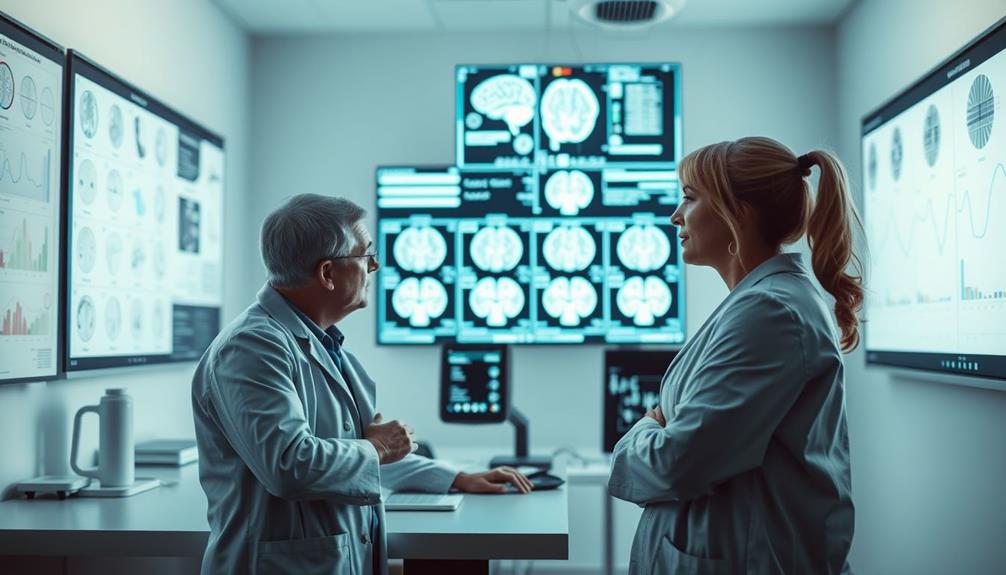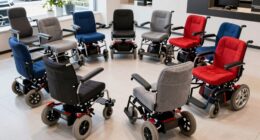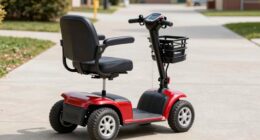Gabapentin can have a significant impact on cognitive function, so it is crucial for caregivers to be informed about its effects. This medication increases the risk of cognitive decline, especially in older adults, which can result in heightened confusion and mood swings. Signs such as memory lapses or difficulty concentrating may be observed in your loved one. It is important to closely monitor these changes and keep track of any observations for healthcare consultations. While navigating this complex situation, you will discover various treatment options and strategies aimed at enhancing quality of life and effectively managing risks. There is plenty of support available to assist you on this journey.
Key Takeaways
- Gabapentin is linked to an increased risk of cognitive impairment and dementia, particularly in older adults and those with mild cognitive impairment.
- Caregivers should monitor for signs of confusion, mood swings, and memory issues in patients taking gabapentin.
- Non-pharmacological interventions like cognitive stimulation and structured activities can enhance quality of life and reduce reliance on medications.
- Alternative medications, such as SSRIs and antipsychotics, may be considered, but they also carry significant side effects and risks.
- Continuous evaluation of medication regimens is essential to mitigate adverse effects and identify safer treatment options for patients.
Understanding Gabapentin

Gabapentin, a medication often prescribed for conditions like neuropathic pain and epilepsy, works by modulating neurotransmitter release in the brain. It binds to the alpha-2/delta-1 subunit of voltage-gated calcium channels, which influences the release of GABA and glutamate. This unique mechanism makes Gabapentin effective, but it raises important considerations, especially for older adults.
Given the potential for cognitive decline, it's vital to understand the financial implications of medication management, as many families may struggle with assisted living expenses associated with caregiving for elderly individuals. You might be concerned about cognitive impairment, as studies indicate that Gabapentin can negatively impact cognitive function, particularly in those with pre-existing cognitive decline.
The increased medication use among older adults from 2006 to 2019 highlights this issue. Additionally, research suggests that using Gabapentin is linked to an elevated risk of dementia, evidenced by a 1.45 adjusted hazard ratio for users compared to non-users.
If your loved one is taking Gabapentin, be cautious about potential side effects like sedation, dizziness, and disorientation. These effects can exacerbate the challenges faced by elderly patients, especially when combined with other central nervous system-active medications.
Monitoring medication interactions and cognitive health is essential to guarantee their well-being.
Cognitive Function Overview

When considering cognitive function, it's crucial to understand the various risk factors for dementia, especially if you're using medications like gabapentin.
Additionally, it's important to research the potential interactions of medications and their long-term effects on cognitive health, as highlighted in risks and rewards of Bitcoin IRAs.
You should also be aware of how gabapentin's mechanism can impact your brain and the safety concerns that arise with its use.
Dementia Risk Factors
Dementia risk factors are vital to understand, especially as the global prevalence of the condition continues to rise dramatically. With an estimated 50 million cases worldwide and 10 million new diagnoses each year, awareness is essential.
One key risk factor for dementia is advanced age. In particular, younger individuals under 50 show a remarkably increased hazard ratio (HR: 3.16) for developing dementia when taking gabapentin or pregabalin. Additionally, certain lifestyle factors, such as diet and exercise, can play a role in cognitive health, highlighting the importance of a balanced approach to overall wellness consideration of natural remedies.
Research indicates that the incidence rates of dementia are considerably higher in users of these medications, with 980.60 cases per 100,000 person-years compared to 605.48 in non-users. This suggests a potential link between gabapentin use and cognitive impairment.
Furthermore, studies show that the adjusted hazard ratio for dementia risk in patients using gabapentin or pregabalin stands at 1.45, indicating a 45% increased risk in this demographic.
It's also important to observe that cumulative doses of gabapentin correlate with higher dementia risk, as hazard ratios increase with greater medication usage over time. This finding underscores the need for careful monitoring of medication use in older adults to help mitigate dementia risk effectively.
Gabapentin Mechanism Explained
Understanding how gabapentin affects cognitive function is vital, especially for those evaluating its use. Gabapentin, a GABA analog, primarily alters neurotransmitter activity by binding to specific calcium channels. This action modulates calcium flux, affecting the release of excitatory neurotransmitters like glutamate.
Individuals with certain mental health disorders, such as Borderline Personality Disorder (BPD), may experience heightened sensitivity to cognitive changes, making it important to monitor gabapentin's impact on cognitive function. While it can provide benefits, it may also lead to decreased neuronal excitability and impair synapse formation, potentially contributing to cognitive decline.
Here are some key points to reflect on:
- Gabapentin can cause cognitive impairment, particularly in older adults.
- Higher cumulative doses of gabapentin are linked to increased dementia risk.
- The adjusted hazard ratio for dementia risk in gabapentin users is 1.45.
- Neuropsychiatric side effects, such as sedation and disorientation, may complicate cognitive function.
- Younger patients under 50 years have a significantly higher risk (HR: 3.16).
These factors underscore the importance of careful monitoring when prescribing gabapentin, especially for older adults or those with existing cognitive issues.
It's essential to weigh the benefits against the potential risks to guarantee the safest and most effective treatment plan.
Medication Safety Concerns
Medication safety concerns surrounding gabapentin are significant, especially regarding cognitive function. Studies show that gabapentin and pregabalin are linked to a higher incidence of dementia, with exposed individuals showing rates of 980.60 per 100,000 person-years compared to 605.48 in non-exposed groups.
If you're caring for someone on these medications, it's important to acknowledge that the adjusted hazard ratio for dementia risk stands at 1.45, indicating a 45% increased risk. Understanding the emotional impact of such medications is also essential, as caregivers may need to support their loved ones through feelings of confusion or distress.
Additionally, financial implications in divorce can complicate caregiving responsibilities, highlighting the importance of a stable support system. Younger adults, particularly those under 50, face the highest risk, with a hazard ratio of 3.16. This highlights the need for caution when prescribing gabapentin to younger populations.
Additionally, the concurrent use of gabapentin with other central nervous system-active medications, like opioids and benzodiazepines, raises serious medication safety concerns. This combination can lead to increased risks of respiratory depression and overdose.
Gabapentin's Mechanism of Action

Gabapentin often works by mimicking the neurotransmitter GABA, binding primarily to the alpha-2/delta-1 subunit of voltage-gated calcium channels. This action modulates calcium fluxes, which influences neurotransmitter release.
By decreasing the release of excitatory neurotransmitters like glutamate and substance P, gabapentin reduces neuronal excitability and may lead to cognitive impairment. Additionally, understanding the benefits of choosing the best heat pump can provide insights into how advanced technology may influence health and well-being in home environments.
Here are some key points about gabapentin's mechanism of action:
- It enhances GABAergic neurotransmission, vital for cognitive function.
- The medication has anxiolytic, antiepileptic, and analgesic effects.
- Gabapentin may increase the risk of dementia due to the overexpression of alpha-2/delta proteins in brain regions, such as the hippocampus.
- Long-term use raises concerns about cognitive health.
- Understanding its effects can help you make informed decisions about treatment.
As a caregiver, it's important to be aware of how gabapentin works and its potential implications for cognitive function.
Keeping an eye on any changes in cognitive abilities will guarantee that you can address concerns as they arise and discuss them with healthcare professionals.
Risks of Cognitive Impairment

Many users of gabapentin may not be aware of the significant risks associated with cognitive impairment. Research shows that gabapentin and pregabalin are linked to an increased risk of dementia, particularly in younger patients under 50 years old, who face a threefold higher risk. As a caregiver, it's essential to stay informed about these potential neuropsychiatric effects.
| Risk Factor | Impact |
|---|---|
| Increased dementia risk | 1.45 times higher for gabapentin users |
| Incidence rate of dementia | 980.60 per 100,000 person-years |
| Risk for younger patients | Hazard ratio of 3.16 |
| Cumulative dose effects | Higher doses correlate with decline |
| Neuropsychiatric effects | Cognitive impairment and excitability loss |
The data underscores the importance of monitoring those under your care for signs of cognitive decline while using gabapentin. Be proactive in discussing any concerns with healthcare providers, as understanding these risks can help you make informed decisions about treatment options. The relationship between gabapentin and cognitive health is complex, but awareness is your first step toward ensuring safety.
Gabapentin Usage Trends

The rising prevalence of gabapentin among older adults raises important questions about its usage patterns and implications for cognitive health. Between 2006 and 2019, gabapentin use surged markedly in various cognitive states, particularly among dementia patients.
Understanding the implications of financial mistakes to avoid can help caregivers navigate the complexities of managing medication costs and ensuring proper treatment. Consider these key trends:
- Gabapentin usage increased from 1.9% to 5.6% in older adults with normal cognition.
- The prevalence rose from 3.0% to 8.0% in those with mild cognitive impairment (MCI).
- For dementia patients, usage went from 2.0% to 5.2%.
- Concurrent use with opioids was reported in 16.1% of older adults with normal cognition and 10.8% of dementia patients.
- Up to 64% of dementia patients were prescribed antidepressants alongside gabapentin.
As a common contributor to polypharmacy, gabapentin raises concerns about safety and efficacy, especially when combined with other central nervous system-active drugs.
The increasing trend of gabapentin use among older adults emphasizes the need for further research to understand its potential impact on cognitive impairment and overall health in this vulnerable population.
As a caregiver, staying informed about these trends is critical for ensuring the well-being of those you care for.
Impact on Dementia Patients

When considering gabapentin for dementia patients, it's vital to weigh the cognitive risks against its potential benefits.
Research has shown that certain medications, including those used for pain management like gabapentin, can impact cognitive function in older adults, particularly those with existing health conditions mammography guidelines.
You need to stay informed about its utilization trends and how it interacts with other medications.
Monitoring for safety concerns is essential, as gabapentin can lead to sedation and cognitive decline in vulnerable populations.
Cognitive Risks Overview
In light of emerging research, using gabapentin and pregabalin raises substantial concerns regarding cognitive risks, especially for dementia patients.
Studies indicate that these medications are linked to a higher risk of cognitive impairment, particularly in older adults. The adjusted hazard ratio for developing dementia in users of gabapentinoids is remarkably concerning.
Additionally, the potential for side effects such as gastrointestinal issues may further complicate the management of patients with cognitive decline. Managing these side effects can be especially challenging in individuals with mild cognitive impairment, as they may already struggle with adhering to treatment regimens or communicating discomfort. Early detection of gastrointestinal issues in these patients is critical to ensure that their overall health is not further compromised. Clinicians should carefully monitor any changes and adjust treatments accordingly to maintain an optimal balance between medication efficacy and patient well-being.
Here are key points to reflect on:
- Increased Risk: Users of gabapentin have a 1.45 times higher risk of developing dementia compared to non-users.
- Incidence Rates: The dementia incidence rate is considerably higher in gabapentin users, with 980.60 cases per 100,000 person-years.
- Younger Patients: Those under 50 years experience even greater risks, with a hazard ratio of 3.16.
- Dosage Impact: Higher cumulative doses of gabapentin correlate with increased dementia risk, underscoring the importance of dosage management.
- Mechanism of Action: Gabapentin impacts GABAergic neurotransmission, potentially leading to cognitive decline.
Given these findings, it's essential to weigh the benefits and risks of gabapentin in dementia patients carefully.
Always consult a healthcare provider for guidance tailored to individual circumstances.
Gabapentin Utilization Trends
Recent trends indicate a significant rise in gabapentin use among older adults, including those with varying degrees of cognitive impairment. Between 2006 and 2019, the prevalence of gabapentin use increased significantly: from 1.9% to 5.6% in those with normal cognition, 3.0% to 8.0% in mild cognitive impairment (MCI), and 2.0% to 5.2% in dementia patients.
This growing reliance on gabapentin raises concerns about polypharmacy, especially when you consider that many users are concurrently taking other medications. In addition, understanding the potential impact of various investments, such as Gold IRAs, can provide caregivers with insights on financial strategies to support long-term care needs.
For instance, 16.1% of patients with normal cognition, 14.3% with MCI, and 10.8% of dementia patients were using gabapentin alongside opioids. Moreover, a significant portion of gabapentin users also received antidepressants, with 39% of those with normal cognition and up to 64% in dementia patients on these medications.
Alarmingly, around 14% of dementia patients were prescribed three or more CNS-active drugs, intensifying risks associated with polypharmacy. As gabapentin utilization trends upward, it's essential to investigate its safety and efficacy, particularly regarding cognitive health and potential medication interactions.
Medication Safety Concerns
As the use of gabapentin continues to rise among dementia patients, safety concerns become increasingly important. The risk of cognitive impairment and adverse effects must be front of mind for caregivers. Understanding the medication safety issues surrounding gabapentin is necessary to guarantee the well-being of those you care for.
Here are some key points to reflect on:
- Gabapentin has been linked to a 45% increased risk of developing dementia.
- Combining gabapentin with other CNS-active medications raises the likelihood of respiratory depression and overdose.
- Approximately 14% of dementia patients are on three or more CNS-active medications, increasing the risk of falls.
- Common side effects like sedation, disorientation, and dizziness can worsen cognitive issues in dementia patients.
- Regular reviews of prescriptions are essential, as many patients stick to one or two medications for over a month.
Given these concerns, it's important to stay vigilant about the medications your loved ones take. By prioritizing medication safety, you can help mitigate potential risks and enhance the quality of care for dementia patients using gabapentin.
Caregiver Observations

Caregivers play an essential role in monitoring the effects of gabapentin on patients, especially regarding cognitive function. With the rising prevalence of gabapentin use among older adults with dementia, it's vital to remain vigilant. You should look for signs of cognitive impairment or behavioral changes, as these may indicate potential side effects from the medication.
Here's a quick reference table to help you identify the associated risks:
| Observation | Possible Relation to Gabapentin | Recommended Action |
|---|---|---|
| Increased confusion | Cognitive impairment risk | Consult a healthcare provider |
| Unexplained mood swings | Side effects of medication | Review medication regimen |
| Frequent falls | Interaction with CNS-active drugs | Monitor and guarantee safety |
Keep in mind that gabapentin's use has been linked to a 45% increased risk of developing dementia, particularly in younger patients. As a caregiver, it's essential to conduct regular medication reviews, especially for patients on multiple CNS-active medications, to mitigate risks associated with gabapentin and polypharmacy. Your observations can meaningfully enhance patient safety and care quality.
Monitoring Cognitive Changes
Monitoring cognitive changes in patients taking gabapentin is essential for ensuring their well-being. As a caregiver, you need to recognize that gabapentin use is linked to an increased risk of dementia and cognitive impairment. Regular monitoring can help you catch any changes early on, allowing for timely interventions.
Here are some key aspects to bear in mind while monitoring:
- Watch for signs of cognitive impairment: Difficulty concentrating, memory lapses, or confusion can indicate changes in cognitive function.
- Assess neuropsychiatric side effects: Be alert for sedation and dizziness, which may complicate the evaluation of cognitive changes.
- Evaluate dosage impacts: Higher cumulative doses of gabapentin are associated with increased dementia risk, so track any changes in medication.
- Pay attention to demographics: Younger patients under 50 years have a significant higher risk of dementia, warranting extra vigilance.
- Document observations: Keep detailed records of cognitive assessments and any behavioral changes for healthcare provider consultations.
Treatment Alternatives

When exploring treatment alternatives for cognitive issues related to dementia, you should consider both non-pharmacological interventions and other medication options.
Approaches like cognitive behavioral therapy can help address behavioral symptoms without the risks associated with certain drugs.
If those methods don't work, there are alternative medications, like antidepressants or antipsychotics, that might offer some relief, but they come with their own set of cautions.
Non-Pharmacological Interventions
Non-pharmacological interventions offer an essential alternative for managing behavioral and psychological symptoms of dementia (BPSD). These approaches prioritize supportive care and environmental modifications, steering clear of medication. They can greatly improve the quality of life for both patients and caregivers.
Here are some effective non-pharmacological strategies you might consider:
- Cognitive stimulation therapy: Engaging patients in mentally stimulating activities can help enhance cognitive function.
- Reminiscence therapy: Encouraging discussions about past experiences can evoke positive emotions and reduce agitation.
- Music therapy: Utilizing music to connect with patients can improve mood and decrease behavioral symptoms.
- Structured activities: These promote social interaction and provide a sense of purpose, decreasing feelings of isolation.
- Caregiver training: Empowering yourself with techniques to manage challenging behaviors can improve communication and connection with the patient.
Research shows these interventions can reduce agitation symptoms by up to 50%.
By integrating physical activity and exercise programs, you can further support cognitive function.
Prioritize these non-pharmacological interventions to create a more holistic care approach for those you're caring for.
Alternative Pharmacological Options
As you explore treatment options for behavioral and psychological symptoms of dementia (BPSD), considering alternative pharmacological approaches is vital.
While non-pharmacological interventions like behavioral therapy are the first line of defense, you may need to explore medications if symptoms persist.
Common alternative pharmacological options include antipsychotics like risperidone and aripiprazole. Although effective, these come with significant side effects, including increased mortality and cardiovascular risks.
Antidepressants, particularly SSRIs, can also help manage agitation and depression, but you should weigh their benefits against potential risks.
Benzodiazepines might be prescribed for anxiety, but they pose a higher fall risk and can lead to dependence, making them less suitable for long-term use in older adults.
It's essential to continuously evaluate your loved one's medication regimen, as polypharmacy can lead to adverse effects and complications in dementia.
Regular reviews can help identify safer and more effective treatment alternatives, ensuring that you strike the right balance between managing symptoms and minimizing risks.
Always consult with healthcare professionals to tailor the best approach for your loved one's unique situation.
Future Research Directions

Future research directions should focus on understanding the long-term cognitive effects of gabapentin and pregabalin, especially their potential link to an increased risk of dementia.
With studies suggesting an adjusted hazard ratio of 1.45 for users, it's essential to investigate further.
Here are some key areas for future research:
- Examine the impact of cumulative doses of gabapentin/pregabalin on cognitive decline.
- Investigate the role of polypharmacy, particularly in older adults using multiple CNS-active drugs.
- Conduct clinical trials to evaluate the efficacy and safety of gabapentin for managing agitation in dementia patients.
- Develop clear guidelines for safe prescribing practices of gabapentinoids in vulnerable populations.
- Prioritize regular monitoring of cognitive outcomes and potential adverse effects in patients.
Frequently Asked Questions
How to Care for Someone With Cognitive Impairment?
To care for someone with cognitive impairment, establish a daily routine, engage them in memory activities, guarantee their environment is safe, communicate clearly, and encourage social interactions to enhance their overall well-being and connection.
What Strategies or Techniques Could You Use to Assist People With Cognitive Impairments?
You'll find that engaging individuals in structured routines and cognitive activities, while fostering a supportive environment, can greatly enhance their well-being. Incorporating physical activity and social interaction also boosts cognitive function and reduces agitation effectively.
What Does Gabapentin Do to Your Brain?
Gabapentin affects your brain by binding to calcium channels, reducing neuronal excitability, and modulating neurotransmitter release. This can lead to decreased anxiety and pain, but it may also cause cognitive side effects like memory impairment.
What Is the Biggest Side Effect of Gabapentin?
Isn't it surprising how one medication can change your day? The biggest side effect of gabapentin is sedation, which can leave you feeling drowsy and increase your risk of falls, especially in older adults.
Conclusion
In steering through the complexities of gabapentin and cognitive function, you're like a captain guiding a ship through foggy waters. Staying informed about potential cognitive risks is essential for you and those you care for. By actively observing changes and exploring treatment alternatives, you can chart a safer course. Remember, open communication with healthcare providers can illuminate the path ahead, ensuring that both you and your loved ones sail smoothly through any storm that may arise.









